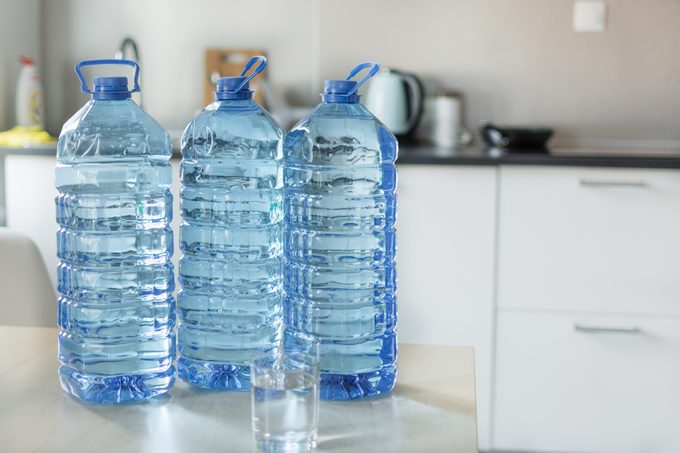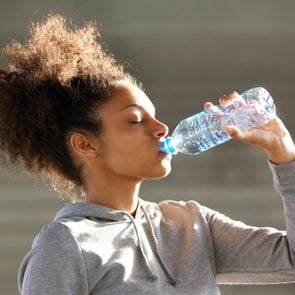Is Drinking a Gallon of Water a Day Good or Bad for You?
Updated: May 11, 2021
Although adverse effects are rare, it's possible to drink too much water. Here's what to know before you up your water intake too soon.
How much water is too much?
Scroll through social media, and you’ll probably come across a celebrity toting the latest fitness accessory du jour.
Nope, it’s not cute yoga pants or a brightly colored headband that keeps frizz from sticking to your sweaty face.
It’s not even a cute water bottle, but you’re getting closer.
The trendy accessory in the world of the rich and famous? A half-gallon water bottle.
It seems like an OK idea at the outset. After all, experts like to remind us to drink enough fluids. You’ve probably heard the recommendation to drink eight glasses of water a day.
Interestingly, though this “rule” has been around for decades, no one really knows where it originated, says Soma Mandal, MD, a board-certified internist at Summit Medical Group in Berkeley Heights, New Jersey.
Which begs the question: if we need about eight glasses a day, is there such a thing as drinking as too much water?
Read on for key facts to know about proper hydration and finding the right balance between enough and too much.
Why is hydration important?
There’s no getting around it: drinking enough water (or other liquids) is crucial for your survival. If you don’t consume enough fluids, you probably won’t feel like your best self.
Proper hydration and water balance is key for every single cell in the body, according to Andrea Love, PhD, an immunologist and microbiologist in Philadelphia.
Water helps with almost every process in your body, from the regulation of body temperature, blood pressure, and gastrointestinal function to the removal of wastes from the body, muscle performance, organ function, and even cognitive abilities.
“Water, along with salts and sugars, create our ‘electrolyte balance,’ which ensures that these bodily processes are tightly regulated for our continued health,” Love says. “Hydration is absolutely essential for our health, and dehydration can be problematic, as it can lead to a variety of negative health consequences.”
(These are the hydration myths you should stop believing.)
What happens if you drink too much water?
When it comes to hydration, the converse can also be true. That’s right, as good as H2O is for you, there can be too much of a necessary thing.
“In rare instances, people can consume too much water too quickly, which can disrupt our electrolyte balance by diluting the salts and sugars in our bodies too much, leading to potentially dangerous consequences,” Love says.
The biggest concern, she says, is dangerously low levels of sodium, or a condition called hyponatremia.
Symptoms of the condition can include nausea and bloating and can quickly progress to more-serious signs, such as weakness, confusion, unsteady gait, and convulsions.
Hyponatremia can lead to a potentially life-threatening condition called water intoxication, which is when your organ systems, including the brain, are affected by the excessive intake of water.
Before you freak out, know that the condition is rare. Love says that people with healthy kidneys can typically compensate in excreting excess water, even if it’s consumed relatively quickly.
So is a gallon of water a day too much?
In general, if you are in good health and take in a lot of water throughout the day, you’ll just pee a lot more.
“Your kidneys and excretory system can typically process about 33 ounces (1 liter) of water an hour, so if you’re drinking large amounts of water spaced throughout the day, your body will simply flush out the excess water with no ill effects,” she explains.
Where you get into trouble is when you try to chug a ton of water very fast.
“If you consume … 1 gallon per day, it won’t necessarily be harmful, provided you drink over an extended period of time, but most people don’t need quite that much water in a given day,” Love says.
She recommends increasing your intake of electrolytes—salts like sodium, potassium, and magnesium, as well as carbohydrates like sugars—when you increase your water intake, such as during exercise. You’ll find them in sports drinks and coconut water as well as add-in products like electrolyte drops and powders.
“This will ensure you can maintain that delicate balance your body needs for optimal health,” she says.
Also those recommendations generally apply to people who are healthy and free of chronic conditions.
People with certain conditions—including those with heart problems, like heart failure; liver or kidney issues, including being on dialysis or having kidney failure; or who have adrenal gland disorders—may need to be on fluid restriction.
If you have a chronic condition make sure you consult your healthcare provider about what’s considered a safe amount of fluid to consume daily.

How to gauge how much water you need
According to Dr. Mandal, everyone’s hydration needs are different. That said, how much water you need to stay hydrated is generally based on weight, activity level, how much you sweat, medications you take, and how hot it gets where you live.
But there is ballpark guidance for people. Typically, health care experts recommend drinking at least half your body weight in ounces of water a day, Love says.
So if you’re 150 pounds, you should aim for 75 ounces of water. For reference, a gallon of water is 128 ounces.
Recommendations from the U.S. National Academies of Sciences, Engineering, and Medicine have provided guidance, suggesting women consume about 90 ounces a day and men consume about 125 ounces a day.
Another way to gauge how much water you need is to look at your urine, Dr. Mandal says. Generally, a clear to pale yellow urine indicates that you are well hydrated.
And, finally, you can just aim to meet the age-old recommendation for eight glasses of water a day.
“No one really knows where the advice of 8 glasses of water came from,” Dr. Mandal says. “But in reality, whether it is a little bit less or a little bit more, this is roughly where your target should be getting your daily hydration.”
Signs you need to drink more water
If you’re not well hydrated, your body will remind you to drink, though it’s best not to wait until those telltale symptoms of dehydration.
“If you haven’t urinated in three to four hours, that is another indicator that you need more water,” says Dr. Mandal.
A dry, scratchy throat, dry mouth, palpitations, headaches, fatigue, muscle cramps, and feeling irritable, are other signs of dehydration.
“Our bodies are able to signal to us when we need more water, and by the time you are thirsty, you are already dehydrated,” she says.
Are there alternative ways to get your fluid intake?
Good news: your hydration tally doesn’t have to include only water, Dr. Mandal says. You can also count the water in your coffee and tea or any other nonalcoholic beverages you may drink during the day.
Water in the food you eat—soup, cucumber, and watermelon, for instance—counts too.
It accounts for about 20 percent of your daily water intake, so go ahead and eat these hydrating foods.
When you’re thirsty, drink water
Although adverse effects are rare, too much water at once can be dangerous. You’re better off sticking to consumption levels that are appropriate for your individual daily needs.
If you’re unsure of what those are, talk to your health care provider to get tailored recommendations.
Remember, every body is different, and it’s important to tune in to yours. If you’re thirsty, chances are you’re dehydrated and you should drink a glass of water to hydrate.
Next, learn about the clever ways to stay hydrated.




















